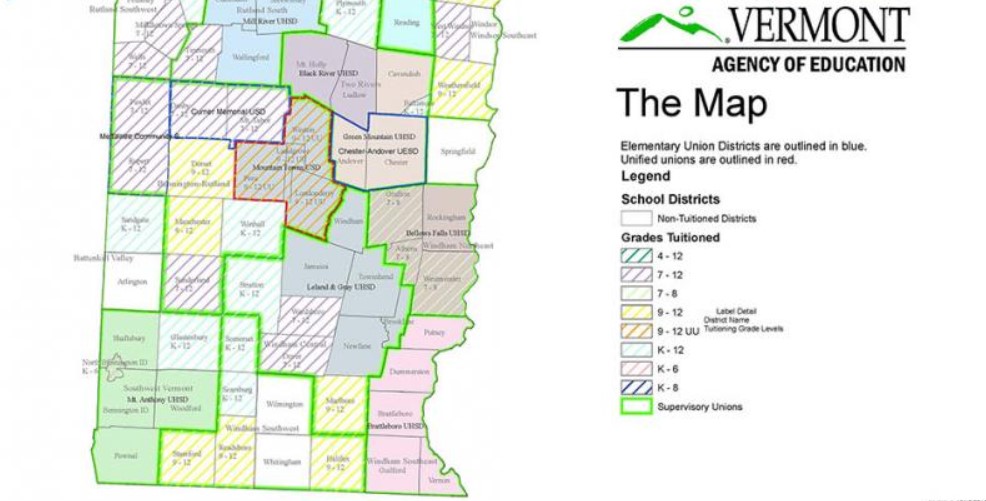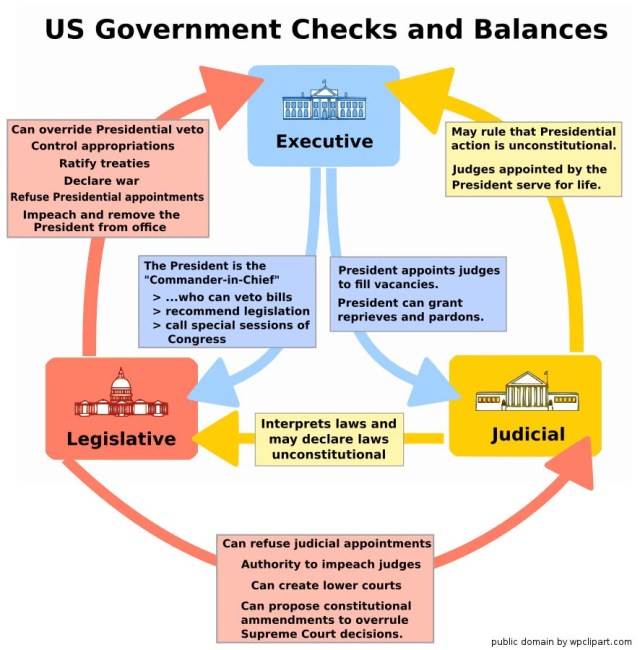Vermont has a unique education system – largely local decision making (locally determined budgets) are backed up with state funding. There is limited public high school choice for all students, and less limited public and private school choice for some districts that do not operate or designate a school for their students. Religious schools have not been able to receive public tax dollars because of the constitutional imperative to maintain separation of church and state.
The American system of government provides checks and balances on legislation, court rulings and administration of the law. That system of checks and balances now finds the U.S. Supreme Court ruling on inconsistency and unintended consequences of school choice law in rural Maine and Vermont and this is changing school choice regulations. Now effectively, if parents are offered school choice tuition dollars for their student, they can not be banned from choosing religious education.
Recent history of school choice in Vermont
The Vermont Constitution requires “…a competent number of schools ought to be maintained in each town unless the general assembly permits other provisions for the convenient instruction of youth.”
Towns like Whitingham and Wilmington operate K-12 schools. Towns like Townsend and Jamaica operate an elementary school and belong to a union high school district (Leland & Gray).
Vermont school districts that do not operate schools for some or all of K-12 grades or don’t belong to union school districts (like Dover, Stamford, Readsboro, and Wardsboro which operate elementary schools and Searsburg, Somerset and Stratton which do not operate any schools) are required to pay tuition to other public or approved independent schools for students in the grades that the district doesn’t operate schools in. Vermont law requires those districts to pay full tuition to public schools and tuition up to the Average Announced Tuition for Union Schools to approved independent schools.
- Public High School Choice, Act 129 of 2012, allows students to apply to attend any other high school in the state. Schools are allowed to limit the number of students who may transfer from a school, with a cap of 10 percent of resident students or 40, whichever is smaller; schools may set higher limits.
- Tuition towns: For grades K-6, the school board may determine the public school(s) to which a district pays tuition (16 V.S.A. § 821). For grades 7-12, the parents or guardians may choose a public or an approved independent high school (16 V.S.A. § 822) unless the district has designated (up to three public or approved independent) schools as its public high school (16 V.S.A.§ 827).
Vermont and Maine are the only two states that let some students use public dollars to pay for private approved independent schools.
Religious schools and public tax dollars in Vermont
For many years, religious schools were not eligible for Vermont tuition money. In 1999, the Vermont Supreme Court determined in Chittenden V DOE that school districts could not pay tuition to religious schools without “appropriate restrictions” and “adequate safeguards” to prevent those funds from religious use like religious instruction. Instead of articulating what those restrictions or “adequate safeguards” were, Vermont just banned religious schools from receiving public tuition money.
- Vermont Statute provides two choices for Independent Schools:
- Approved: An approved independent school is a school other than a public school which provides a program of elementary or secondary education, or both, that is approved pursuant to 16 V.S.A. § 166 (b).
- Recognized: A recognized school is an independent school for any school year that meets the requirements for recognized independent schools, pursuant to 16 V.S.A. § 166 (c), that is not a home study program.
- Directory of Vermont Independent Schools
Federal Court involvement
In 2020, ESPINOZA ET AL. v. MONTANA DEPARTMENT OF REVENUE ET AL. the U.S. Supreme Court ruled that the state of Montana could not exclude religious schools from receiving tax credit-funded scholarships under its school choice program.
In February 2021 a federal appeals court, citing the 2020 Supreme Court decision, ruled that Vermont could not bar schools from eligibility for tuition payments only because they are religious. In addition, a federal Court posed a question to the Vermont Supreme Court regarding Vermont’s inaction since the 1999 ruling: “What is the definition of ‘adequate safeguards’ as set forth in Chittenden Town?”
In June of 2022, the U.S. Supreme Court ruled that Maine could not exclude religious schools from its school tuitioning program. The 6-3 decision found that Maine’s program violates the Constitution’s free exercise clause, which guarantees the right to practice one’s religion freely. That decision will have implications for Vermont.
In the Maine case, the court said that the state could not award some parents a “public benefit” — tuition money — while “denying the benefit based on a recipient’s religious exercise,” to other parents. The Carson v. Makin, question was essentially whether state governments that allow public dollars to offset private education costs (like Maine and Vermont) should also be required to fund religious instruction. The case was brought by two Maine families who live in rural areas with no public high school. They argued the state should pay for their children to attend Christian high schools as part of its tuition policy. Maine law, like Vermont, has allowed public dollars to be used to pay tuition to private schools as long as those schools are not religious.
But the Supreme Court’s majority opinion said Maine’s current tuitioning system amounts to “discrimination against religion.” “Maine has decided not to operate schools of its own, but instead to offer tuition assistance that parents may direct to the public or private schools of their choice,” the decision stated. “Maine’s administration of that benefit is subject to the free exercise principles governing any such public benefit program — including the prohibition on denying the benefit based on a recipient’s religious exercise.”
The Supreme Court decision marks the first time that the court has explicitly required taxpayers to support a specific religious activity, AND the Court did not address the question of whether a religious institution can cite sincerely held religious beliefs to violate laws against discrimination.
Vermont has had controversy over school choice for some time. It is not available in the same way to all Vermont students, sometimes it is used to pay for some students out of country or cross country education and special education rules are not consistently implemented. With religious schools in particular, there have been concerns about discrimination against LGBTQ persons. And, notably, Vermont’s constitution states that Vermonters cannot be forced to support religious practices that they do not believe in.
- Tried to limit geographic scope of schools some students could choose
- Choice itself is inequitable
- In a Vermont Christian school, a state investigation highlights anxiety over discrimination
The dynamic and changing school choice policy landscape will most certainly be addressed in the upcoming legislative session. Senate Education Chair Brian Campion tried to put some definition to the ‘adequate safeguards’ aspect of tuition dollars going to religious schools last year, but the House wanted to wait and see what the Supreme Court did. The inequity of choice, and the inequitable application of special education curriculum are not resolved.
If your town/school district currently has some sort of choice and tuition for independent schools, they are likely in for a bumpy couple of years with the legislature and the courts as these issues are worked through and addressed. I will provide updates on major shifts and policy changes as this proceeds.
Since my election in 2014, I have pledged to:
- Defend the choice my towns had, but have also been clear that I believed choice in the state was inequitable, and so probably would face constitutional challenge.
- Oppose an expansion to universal school choice. In our rural state, we can not equitably serve all Vermont students with universal choice and will, in fact, exacerbate inequity if we were to move to a universal model. There are not enough students to ensure stability for all schools with universal choice and there are large geographic pockets with significant topography that are without schools in Vermont.
I strongly support parents having the choice to enroll their students in religious K-12 schools, and paying out of pocket to do so. I’ve not taken a public position on public funding being used to provide tuition to religious schools. I do have deep concerns about violating the separation of church and state, even with the technicality that the US Supreme Court has ruled on, and about discrimination towards other religions, women, and LGBTQ that is inherent in some religions. I’m troubled by the present policy spaces created by the court rulings.
I’d like to hear from you. What are your thoughts on your public tax dollars being used to fund Vermonters Islamic, Jewish, Christian and Wicca religious education? Please email or call with your thoughts.
Kind regards,
Rep. Laura Sibilia Dover, Readsboro, Searsburg, Somerset, Stamford, Wardsboro, Whitingham
running for election in 2022 to represent Dover, Somerset, Stratton, Jamaica and Wardsboro
lsibilia@leg.state.vt.us
(802) 384-0233




Rep. Sibilia,
I do not support public tax dollars going to religious schools. As a member of the Jewish minority in this country, I gave always taken solace in the fact that there us separation if church & state, especially in the classroom. ‘Gulifeather’ laws have long died and rightly so. I would surely protest any portion of my real estate tax dollars going toward public education in a secular venue. Religion must always be practiced freely, but keep it in the churches, temples & mosques for those parents who chose that path for their children. Please work to keep my education tax dollars out of the religious arena.
Respectfully,
Francine Panely, Jamaica Vt.